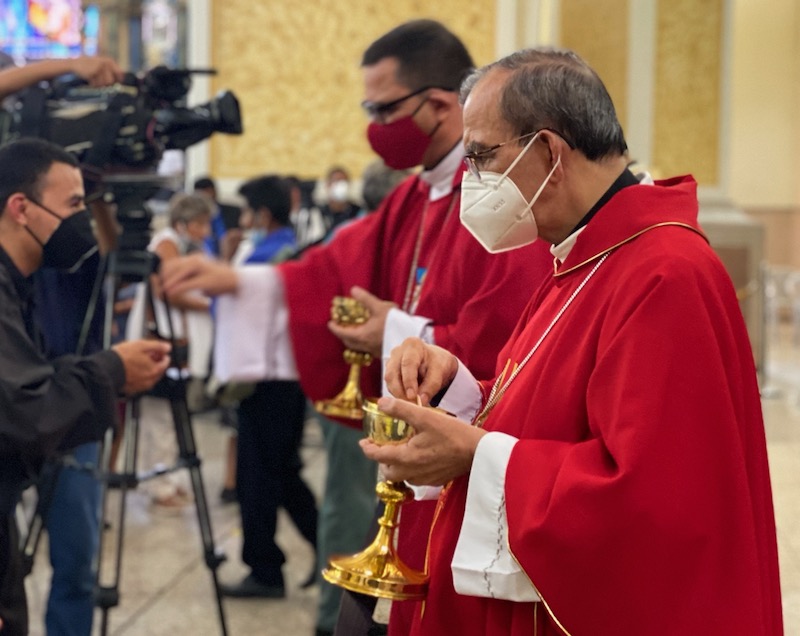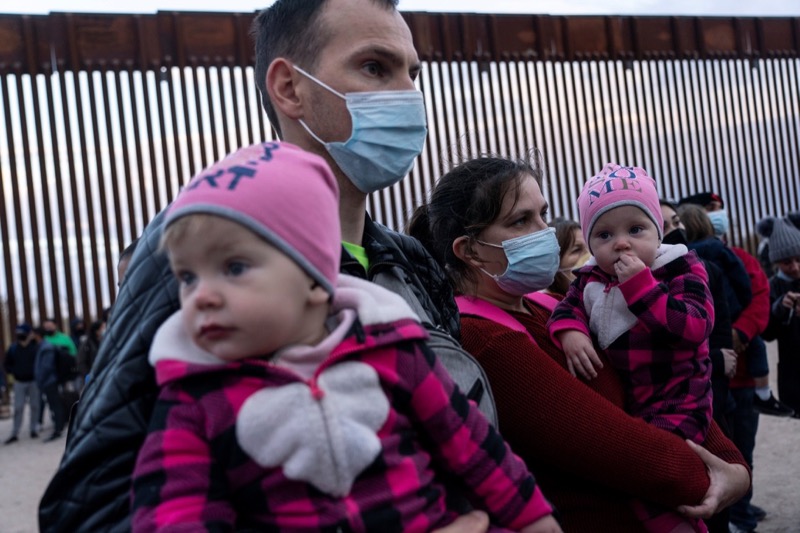Ukrainian church leaders have urged a tougher Western response to the bloody war in their country, as invading Russian forces attack residential areas and prepare for an assault on Kyiv.
The United Nations confirmed that 1.7 million refugees have now fled abroad, with tens of thousands more displaced inside the country.
“This is not a military operation, but a war, a war first of all against civilians,” said the head of Ukraine’s Greek Catholic Church, Archbishop Svetoslav Shevchuk of Kyiv-Halich.
“Ukraine stands and Ukraine fights, and I thank all those worthily exercising state power at various levels and organising the population's protection. But I also note with great sorrow that all the talk about green corridors, of evacuating people from cities suffering most from the encirclement and bombing, are not true. So we are asking the world community to close the skies over Ukraine, where Russian cruise missiles are killing the most people.”
The archbishop issued the appeal as a third round of talks between Russian and Ukrainian delegations took place on Monday, with Moscow continuing demands that Ukraine accept neutrality and “demilitarisation”, while recognising its forced 2014 annexation of Crimea and independent republics at Donetsk and Luhansk, where more than 14,000 soldiers and civilians have died in eight years of fighting with Russian-backed separatists.
Meanwhile, the president of Ukraine's Roman Catholic Bishops Conference, Archbishop Mieczyslaw Mokrzycki of Lviv, said virtually all Catholic priests and nuns had opted to remain in place across Ukraine, adding that he and other bishops had asked the Pope to renew St John Paul II's symbolic dedication of Ukraine and Russia to the Immaculate Heart of the Virgin Mary, in recognition that “evil continues flowing from Russia and engulfing the Ukrainian lands with a bloody fire”.
The Polish-born archbishop said the “courage and effectiveness” of Ukrainian resistance had “shocked the world”, but also warned that Russia's negotiating tone suggested there was “no hope of any swift end to the aggression”.
He told Poland’s Catholic Information Agency: “The Ukrainian nation has enjoyed independence for just 30 years. It wishes to remain a free nation and has a full right to do so, and the whole of Europe, including Russia, should understand this.
“While expressing gratitude to our Church and all European countries for the help they show us, our president is asking for closure of the airspace over Ukraine. This would certainly be useful and contribute effectively to ending hostilities.”
President Vladimir Putin’s forces invaded in the early hours of 24 February, triggering harsh resistance from Ukraine’s 200,000-strong armed forces, as well as sharp fall in Russia’s ruble currency amid Western economic sanctions and pledges of military assistance to Kyiv.
Addressing Catholics in Rome on Sunday, the Pope said “rivers of blood and tears” were now flowing in Ukraine, and called for “guaranteed humanitarian corridors” for civilians seeking emergency aid and shelter.
He added that he had sent two Rome-based cardinals, Konrad Krajewski, his papal almoner or household director, and Michael Czerny, interim prefect of the Vatican's Dicastery for Promoting Integral Human Development, to Ukraine to offer aid and spiritual support.
“This is not merely a military operation, but a war, sowing death, destruction and misery. The number of victims is increasing, as are people fleeing, especially mothers and children,” the pontiff said.
“I make a heartfelt appeal for aid to be guaranteed and access facilitated to the besieged areas, in order to offer vital relief to our brothers and sisters oppressed by bombs and fear. I thank all those who are taking in refugees. Above all, I implore that the armed attacks cease, that negotiation and common sense prevail, and that international law be respected once again.”
Cardinal Czerny told Vatican Radio on Monday his joint mission would be a “concrete sign of solidarity” from the Pope with suffering Ukrainians and “expression of opposition to the cruel war”, and help ensure Africans and Asians fleeing the country were “treated equally in seeking a safe haven”.
Meanwhile, more appeals to President Putin to stop the war came from Orthodox leaders abroad, including Patriarch Porfirije Peric of Serbia, who said in a weekend sermon the war spelled “danger for those of us living in areas still divided and insufficiently reconciled”.
Direct peace appeals have been made, unsuccessfully, by Catholic Bishops Conferences in Britain, Germany, Poland and other countries to Patriarch Kirill of Russia, where over 5000 people were arrested during anti-war protests on Sunday amid a nationwide clampdown on news and information.
In messages last week, the World Council of Churches urged Kirill to “intervene and mediate” with Russia's rulers, while the president of the Geneva-based Conference of European Churches, Christian Krieger, said millions of Christians were “appalled by the aggression of the Russian armed forces”, and also pleaded with Kirill to “affirm the value of all human lives, including the lives of Ukrainian citizens under attack”.
“Religious and political leaders around the world, as well as the faithful of different churches are waiting for you to recognise the aggression, and call on your country's political leadership to end the war”, the French Lutheran told the patriarch.
“I am disheartened by your daunting silence on the unprovoked war that your country declared against another country, which is home to millions of Christians, including Orthodox Christians that belong to your flock.”
However, in a rambling Moscow sermon on Sunday, Patriarch Kirill said Russia had entered “into a struggle that has not a physical, but a metaphysical significance”, adding that the Orthodox Christians in eastern Ukraine had suffered for “fundamentally rejecting the so-called values offered today by those claiming world power”.
“If humanity does not recognise that sin is a violation of God's law, if humanity sees sin as just an option of human behaviour, then this is the end of human civilisation”, said the Russian Orthodox leader, whose remarks were carried by the Interfax news agency.
“Let us pray all those fighting today, shedding blood and suffering, will enter into the joy of resurrection in peace and joy. What joy will there be if some are in peace, and others under the power of evil, in the sorrow of internecine warfare.”
In a sign of deepening division within Ukraine's Moscow-linked Orthodox church, priests in most eparchies, or dioceses, are now refusing to remember Patriarch Kirill in parish liturgies, citing his failure to condemn the war, as more clergy groups demand their church declare independence from the Moscow Patriarchate.
Numerous historic churches in Ukraine have been damaged or destroyed by Russian missile attacks and shelling, including Kharkiv’s Orthodox Holy Dormition cathedral and St Anthony’s university church, and places of worship in the besieged southern city of Mariupol, Boryspil and other urban centres.
A Catholic director of Ukraine's Caritas Spes charity, Fr Wojciech Pasiewicz, told The Tablet that Kharkiv’s Catholic Assumption cathedral had now also been closed after its windows and fabric were damaged by Russian missile fire, adding that the adjoining diocesan curia and Caritas HQ had also been hit by missile blasts while at least 70 people were living or sheltering inside.
The priest said his Church had been unable to keep data on deaths and injuries among Catholics in the heavily shelled eastern city, where the sound of explosions and shooting was “now constant” and Masses were taking place in private houses.
“We are simply praying and doing all we can to stay in touch with our faithful, while many hide out in parish basements”, Fr Pasiewicz told The Tablet. “The children are terrified, and there's fear and panic everywhere, with some still hoping to be evacuated. We should all be praying for peace and mourning the dead, uniting in hope that this will all end today or tomorrow”.
Meanwhile, a Catholic bishop said last week’s Russian attack on a nuclear reactor at Zaporizhia had caused widespread panic, adding that local officials had urged residents to drink iodine in anticipation of a major radiation leak.
“If the actual power plant had been fired on, the catastrophe would be much bigger than in Chernobyl, since this is the largest nuclear power plant in Europe,” said Bishop Jan Sobilo, an auxiliary with Ukraine’s eastern Kharkiv-Zaporizhzhia diocese. “Despite this, we have enough to eat in Zaporizhia, as we are organising help for other besieged cities such as Kyiv, Kharkiv and Mariupol, and preparing for refugees from those already occupied and under heavy shelling.”
In an appeal to the international community on Sunday, the head of Ukraine’s independent Orthodox church, Metropolitan Epifanij Dumenko, said Russia’s President Putin already believed he was “at war with America and Nato on our soil” and also urged Western governments to close Ukrainian airspace to Russian jets and missiles.
Meanwhile, Bishop Sobilo warned the whole civilian population had now mobilised to defend the country and was ready to repel Russian tanks and armoured vehicles with automatic weapons and molotov cocktails, adding that many Russian soldiers appeared “disorientated and demoralised” by the fierce Ukrainian reaction, but feared being shot by their commanders if they attempted to surrender and withdraw.
“If Putin succeeds in plundering the whole of Ukraine, his army will gather and move on to the countries of NATO, so Ukraine is fighting today not just for its own freedom, but for a new era of humanity,” the Catholic bishop told The Tablet.
“Putin has united this nation through war, mobilised it to fight and created huge opposition to Russia. The whole world should have rejected him long ago as the great malefactor that he is. This could means the end of Putin himself, the end of the Russian Federation and the end of the Soviet propaganda that's endured to this day.”



 Loading ...
Loading ...